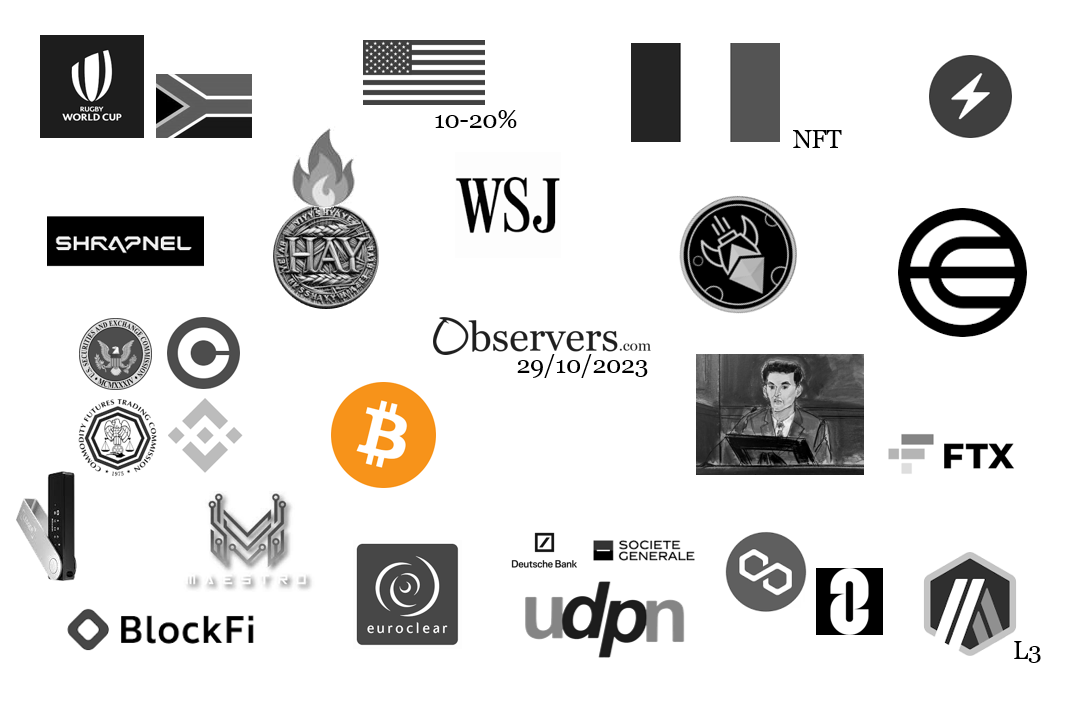
South Africa has won a record-breaking fourth Rugby Union World Cup Final, beating the All Blacks of New Zealand in Paris's Stade de France Stadium. Despite the All Blacks scoring the only try of the match in the second half, it wasn't enough to break the Springbok's lead, and the final score ended at 12-11.
But who are the winners in the crypto world this week? And who needs to try, try again? Read on to find out.
The normally reserved and statesmanlike Bitcoin was grabbing headlines earlier in the week, as price pumped to a 17-month high of nearly $35,000. This appeared to be in anticipation of what many believe is the imminent approval of a spot bitcoin ETF, which will open up the market to a new wave of institutional investors.
Staying with the institutional adoption of blockchain and cryptocurrency, the Universal Digital Payment Network aims to bridge regulated stablecoins, CBDCs, and financial institutions, and announced its first trial stablecoin swaps this week. Also, Euroclear launched its RWA tokenization platform with an inaugural 100 million euro bond issued by the World Bank.
From institutional adoption we take the almost superhuman leap to blockchain gaming... we have deceptively long and powerful legs btw... France has introduced new legislation that will finally differentiate blockchain and NFT-based games from the gambling category that they were previously regulated in. But the bigger news in blockchain gaming this week was the $20 million Series A funding raised by Shrapnel, a AAA Web3 extraction shooter planning an early access launch in December... and clearly a game rather than gambling.
Meme-coins were making headlines, as the not-quite-so Safereum apparently rug-pulled its users (and after making so much effort to initially convince them that it was kosher). Meanwhile, Uniswap founder Hayden Adams made a big deal of disassociating himself from his five-year-old test token HayCoin, burning his entire stash of $650 billion worth, and making the 0.01% of tokens remaining pump like crazy.
Sam Bankman-Fried surprised many by taking to the stand in the fourth week of his ongoing fraud trial, which may prove to be an incredibly bad move. His former cryptocurrency exchange FTX also surprised many when it announced that it had received three bids to reboot the exchange following its well-publicised bankruptcy, while fellow exchange BlockFi emerged from its own FTX-linked bankruptcy, opening withdrawals to the majority of BlockFi Wallet users.
If a sale of (whatever is left of) FTX does go ahead, then any money raised will likely go towards compensating customers for their missing assets. Optimism over the eventual settlement terms increased this week, as specialist traders were paying over 50 cents on the dollar to buy out some FTX customer claims. FTX was also spotted moving various assets to Binance and Coinbase, presumably to prepare for their sale. The proceeds of this would also add to the recovered funds earmarked for former customers.
Sticking with Binance and Coinbase, both exchanges have been raising the heat in their battle with U.S. regulators. Coinbase claims that the SEC has overstepped its remit and has no authority over crypto, while Binance accuses the CFTC of a very similar thing in trying to regulate foreign individuals and corporations. Outside of the U.S. Binance has also had a bit of a rollercoaster week in Europe. On the upside, it reinstated euro deposits and withdrawals after finding a new fiat banking partner. But on the downside, the head of Binance U.K. resigned and Visa ended its partnership on Binance branded payment cards.
The Wall Street Journal back-pedalled after misrepresenting data in an article regarding crypto funding of the terrorist organization Hamas. It was too late to stop U.S. senators from seizing on the report as yet more reason to come down hard on the entire cryptocurrency industry, however. Also misleading the public this week were disputed figures on crypto adoption, with Coinbase claiming 20% of U.S. adults own cryptocurrency while the Federal Reserve says 10%. We took a closer look and decided that they were probably both wrong.
There were several developments on the Ethereum infrastructure scene, with the major Layer 2 chain Arbitrum bringing the network to a whole new level with the launch of its Orbit Layer 3 solution. Polygon took further steps towards next year's 2.0 update with the introduction of the MATIC-replacement POL's token contracts on the Ethereum mainnet. And LayerZero put forward a plan to bridge Lido's wstETH tokens across four different blockchains, although users were concerned that the project had not received an official endorsement from Lido.
The Maestro Telegram bot was the victim of a hack on its Router 2 contract, which saw a value of around 280 ETH stolen. However, the team quickly sprung into action, buying up the exact tokens to replace those stolen, and even giving affected users a 20% bonus as a goodwill gesture. Meanwhile a key lightning network developer and security expert has left the team following the discovery of a vulnerability with no immediate resolution apparent.
Finally on to recovery, with Ledger finally launching its much-maligned optional paid-for service allowing users to split their encrypted seed phrase and store it with third parties. 'Not your keys, not your coins' apparently doesn't apply if you can't remember your keys without somebody to help you.
Possibly beyond recovery, however, is Worldcoin. Faced with a, shall we say, less than thriving secondary market for its native WLD tokens, it has been forced to extend its WLD loans to market makers just to ensure there is some liquidity on exchanges in case anyone wants it. But pity the project's poor 'Orb' operators, who will now be paid for their efforts in the virtually-useless WLD, rather than the much-preferable USDC. Will it save the Worldcoin project from oblivion? At least it will try, try again.
